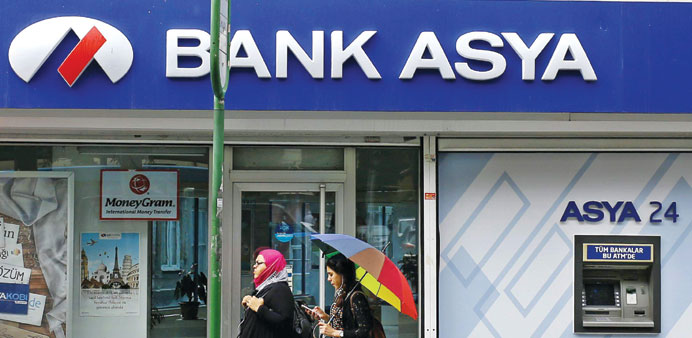Bloomberg/Istanbul
Speculation that the Turkish government may be closer to relinquishing control of Bank Asya has stoked its stock to a record gain. Bondholders proved harder to please.
Shares of the Istanbul-based lender soared more than 50% after it said most Class-A holders provided documentation to the regulator proving they’re qualified to be founding partners. The bank’s Islamic bond climbed about 3% to 61.474 cents on the dollar in the week of April 12.
The security was the world’s worst-performing dollar sukuk last year as a feud between Turkish President Recep Tayyip Erdogan and US-based cleric Fethullah Gulen, whose followers founded the bank, resulted in a series of regulatory actions against the lender. Government control is considered positive for bondholders, according to Commerzbank.
“When it comes to the debt structure there was really no threat to the government,” Apostolos Bantis, a Dubai-based credit analyst at Commerzbank, said by phone on April 22. “I don’t think the government is concerned with the bond holders because they don’t control the entity.”
The bank’s Islamic bond due March 2023 jumped 38%, the most on record, when Turkey’s agency responsible for resolving failed banks seized control in February as investors bet authorities wouldn’t let the lender default. The Savings and Deposit Insurance Fund, known as TMSF, cited violations of banking regulations on transparency in its organizational structure.
Erdogan has blamed Gulen and his supporters for a corruption probe that in 2013 implicated some cabinet members, and vowed to crack down on the cleric’s interests. The Istanbul-based bank’s talks with Qatar Islamic Bank for a buyout deal failed and state-run TC Ziraat Bankasi decided against a takeover. The market regulator temporarily suspended Bank Asya’s shares from trading in August and barred the lender from selling sukuk, citing ownership “ambiguity.”
The bank’s shares were relegated to a market watchlist in September, where companies trade under conditions of heightened surveillance, and trading is limited to the afternoon only. They have now advanced 40% this year after paring their advance in the last two days by about 17%. They fell 55% in 2014.
“Equity usually reacts more aggressively then debt with news over ownership or management control,” Ahmed Shehada, the head of advisory and institutions at NBAD Securities LLC, said by phone from Abu Dhabi on April 22. The debt rally since shareholders submitted their documents qualifies “as a strong reaction,” he said.
The sukuk’s yield-to-worst, a measure of how much an investor will make in profit payments over the shortest period they can reasonably expect to hold the security, dropped 113 basis points of April 12. Even so, at more than 27% it’s the second-highest globally among dollar-denominated Islamic bonds.
The bank said on April 9 that 152 shareholders, representing about 90% of Class A shares, delivered documents to the regulator. “Investors need the equity shareholding structure clarified,” Commerzbank’s Bantis said. “Once the final outcome of that is clear, bond investors will start to feel more comfortable about going back.”

Bank Asya security was the worst performing dollar sukuk last year
